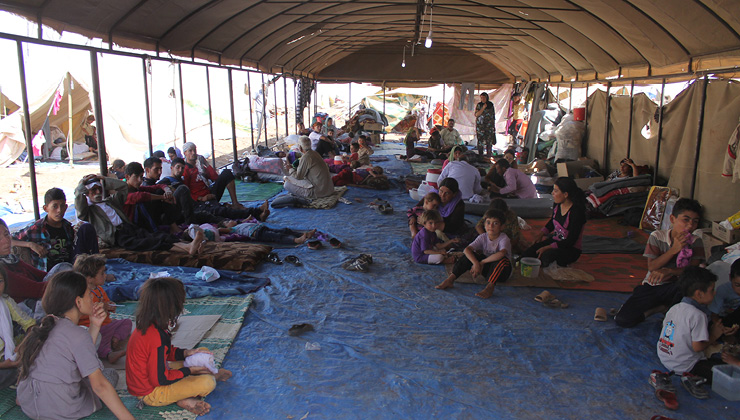The increased visibility of femicide in Latin America has not led to improved systems for recording cases, even though this would facilitate evidence-based policymaking. Yet the participatory process required to move towards proper standardisation of femicide data has already produced a number of important lessons, writes Silvana Fumega of the Latin American Open Data Initiative (ILDA).
Violence against women is a serious problem throughout Latin America and the Caribbean, and the most extreme manifestation of this comes from statistics on femicide. According to data initially compiled by the UN Economic Commission for the region (ECLAC), at least 12 women die every day due to incidents related to their gender.
Femicide is an increasingly visible problem for numerous governments and societies, and between 2010 and 2015 the number of LAC countries with legislation specifically criminalising femicide increased from 4 to 16. But increased visibility has not led to improvements in the systems used to register cases, even though such a change could allow for evidence-based decision- and policy-making.
Towards standardisation
At the beginning of 2017, ILDA began an exploratory study to understand how changes to the production and use of data might contribute to understanding and ultimately combating femicide in Latin America. They designed an action-research methodology to assess the problem, to understand how working with data – particularly open data – could contribute to a solution, and to establish recommendations for the countries involved.
This effort was able to build on work already done on the production and collection of femicide, particularly by the ECLAC Gender Equality Observatory and the United Nations High Commissioner for Human Rights, the latter having already advanced towards standardisation via the Latin American Model Protocol for the Investigation of Gender-Related Killings of Women (the Bogotá Protocol).
ILDA’s past experience of standardising health, procurement, and air-quality data has involved significant participation with those who produce, save, use, and eventually publish data. The very practice of problematising the issue forces organisations to rethink both what data they need and also how they collect, store, process, and utilise that data. That is to say, standardisation not only shapes the production of data, but also leads to silent, localised transformations within bureaucracies.
The research strategy has four stages:
- Establishing what is already known and learning from cross comparisons
- Testing different approaches with key actors in the fields of security, gender, and open data
- Experimenting with the implementation of possible steps towards standardising data
- Identifying how government and wider society can fruitfully make use of standardised data
at least 12 women die every day due to incidents related to their gender
Learning from the process
Though a fully developed standard for collection of femicide data is still some way off, the ILDA’s work in Argentina, Uruguay, Honduras, Jamaica, and Panama already offers a series of lessons on the visibility of feminicide and the need to generate an iterative methodology for standardising data in the public sector, particularly with a gender perspective:
- Concepts matter and different interpretations must be taken into account
There are different “truths”, of which the official truth from one or more state agencies is just one. In the case of femicide specifically, there are often differences even between judicial, prosecutorial, and statistical institutions of the state, for instance. In other words, the same database can admit different interpretations from different public and civil-society organisations in different moments, with different additional sources of data, or in line with different definitions of femicide. Although initially this may be seen as a problem, it is actually a strength, since it fuels dialogue on femicides and femicide policy across all of the affected actors. - Institutional mechanisms should structure data availability with different levels of access
It especially important to clearly identify what mechanisms are in place to validate official femicide data and also which entity will speak when it comes to communicating it. Well-defined governance arrangements are required to ensure that just one single, clear voice propagates and comments on official data. - Dealing with pre-established systems involves issues with manual compilation
Changing pre-existing systems can expend scarce resources on difficult political confrontations, meaning that it can be more productive to try to automate and improve existing processes via algorithmic tools while also promoting changes to data collection itself. There also the need to be clear rules on data governance, particularly as there are often many organisations involved. These should cover how data is obtained from these systems as well as the validation chains to be followed later, including protocols for future data updates and alterations. - Integrating gender perspectives
Not all actors working on this issue will be familiar with relevant gender perspectives, meaning that actors within judicial and security systems may need training on how to collect a series of important data – particularly on victimisers and their relationship to victims – in order to establish whether a given murder constitutes femicide. - Allowing for revisions in light of emerging evidence
Clearly, the death of a woman is not necessarily a femicide. But often during the investigation of a case, or even after it is closed, information may emerge that means reclassifying a past incident as a femicide. As such, we produced a guide to standardising protocols for this necessary stage of reviewing official data. - Drawing regional comparisons
Each country has its own context and legislation, but regional comparison can allow countries to improve the exchange and interoperability of data, both in terms of format and frequency. This means going far beyond the common practice of publishing bald figures in annual reports.
Data analysis and machine learning
It remains an area of much experimentation, but automated processes could help to improve the quality of data and/or provide red-flag mechanisms to help preempt tragic situations, as well as feeding into public policymaking on the issue of femicide.
Not all actors working on this issue will be familiar with relevant gender perspectives, meaning that actors within judicial and security systems may need training on how to collect a series of important data – particularly on victimisers and their relationship to victims – in order to establish whether a given murder constitutes femicide
Overall, more than being a purely technical process, standardisation of femicide is an exercise that allows us to rethink the production of data and its use, while also facing up to existing problems of bias.
There is still a long road ahead in terms of data quality, governance arrangements, and potential uses. Yet, many important steps have already been taken, and as we edge closer to a fuller understanding of the current situation, we also move closer to proper evidence-based policies that can combat this gravest of crimes in Latin America and beyond.
This blog was originally published on the LSE Latin America and Caribbean Blog.
Header Image: Pink crosses erected in memory of women murdered in Ciudad Juárez, Mexico (Steev Hise, CC BY-NC-SA 2.0)
The views, thoughts and opinions expressed in this blog post are those of the author(s) only, and do not reflect LSE’s or those of the LSE Centre for Women, Peace and Security.




